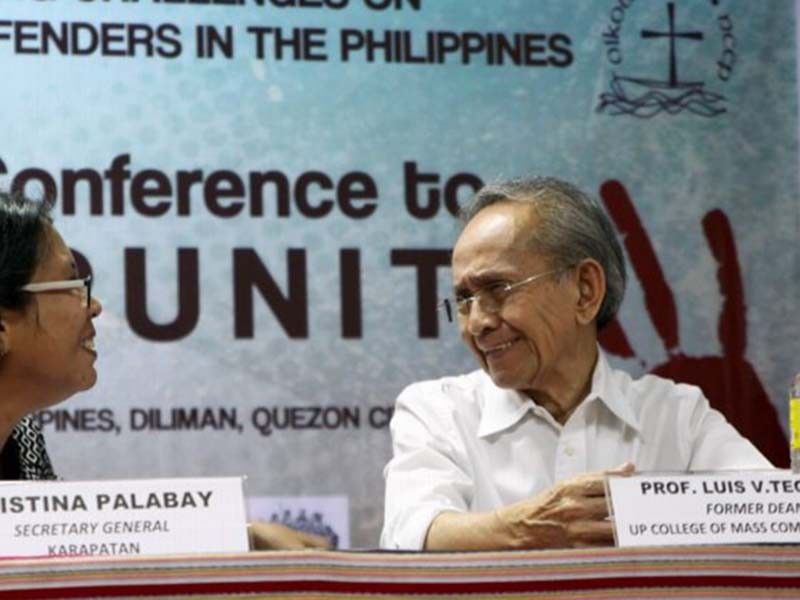Luis Teodoro, Philippine journalism's champion and critic, dies at 81

MANILA, Philippines (Update 2; 3:50 p.m.) — Luis V. Teodoro — a veteran columnist, media critic and champion of the alternative press — has died at 81.
Teodoro, who had a long-running column in BusinessWorld, was deputy director of media monitor Center for Media Freedom and Responsibility, where he helped push for higher standards for the profession through training and through constant reminders on media ethics.
"A pillar of Philippine journalism, Teodoro’s combined careers as an academic and journalist is unparalleled," CMFR said in a statement.
"His place as an esteemed colleague and friend is unique. CMFR will forever uphold his contribution to the work of building of a free and independent press and its role in Philippine democracy."
The Alternative Media Network (Altermidya), of which he was founding chairperson, called Teodoro a pillar of Philippine journalism who advanced "the ideals of pro-people journalism both as a respected member of the academe and through the alternative media that he helped organize in the Philippines."
Teodoro's family has confirmed his passing but has yet to issue a statement.
The National Union of Journalists of the Philippines, which remembered Teodoro as a defender of press freedom, also called him "the staunchest advocate for the best in the profession and the most savage critic of its worst practices" who would continue to be a guide for the profession even after his passing.
"The current and the future generations of journalists have been gifted with Dean Teodoro's lessons on journalism. We pledge to continue his legacy of wielding the pen in the service of the people," the union also said.
Alternative news website Bulatlat, where Teodoro sat on the board, said that he had "many of today's finest journalists in the country, having provided them with tools for analysis they need to better cover stories of marginalized communities and in holding the powerful to account."
The website, in its statement, said Teodoro "was a constant reminder that it is imperative for today's journalists to defend human rights, uphold the highest ethical practice of journalism, and to do their best in bringing about change."
Academic excellence, upholding integrity
Teodoro was a journalism professor at the UP College of Mass Communication, where he was dean for two terms from 1994 to 2000, according to the UP Open University, where he gave a lecture on the political economy of the mass media.
"It was during his deanship that two departments of UP-CMC — the Department of Journalism and the Department of Communication Research — were first named Commission on Higher Education Centers of Excellence," UPOU also said.
"He held a number of professional chairs before his retirement from UP as a full professor of journalism. He conceptualized and raised the initial funds for the construction of the College of Mass Communication Media Center, the cornerstone of which was laid during his deanship of the college."
In a Facebook post, UP CMC said it was "[joining] friends and colleagues in communication and media in mourning [his] passing."
"As educator, editor, and journalist, Dean Teodoro was pivotal in fostering academic excellence in our discipline, upholding integrity in the practice of media, and defending our freedoms of the press, speech, and assembly," it also said.
According to CMFR, Teodoro kept teaching at UP CMC — online during the pandemic and in the classroom when restrictions on face-to-face classes were eased.
Colleagues to carry on his work
Among the remaining journalists from the Martial Law era, and one who was a political prisoner,Teodoro wrote in a BusinessWorld column on the anniversary of People Power that while it was a momentous incident for the nation, it was "hardly" a revolution.
"It did not dismantle or even truly reform the feudal system. The land tenancy anomaly in fact survived it and even emerged stronger than ever. Inviting foreign investments into the country is still the main development strategy of the successors of Marcos, Sr. as it has been since 1946; and industrialization has never been seriously contemplated as economic policy," he wrote on BusinessWorld.
"That 'revolution' was no social upheaval either. It did not end the vast inequality, the social injustice, and the poverty that still afflict millions of Filipinos. And the most that it did politically was to replace one wing of the ruling elite with another. It did not replace the dynasties that have monopolized political power in this country for decades, and in fact eventually allowed the representatives of their most backward, bureaucrat-capitalist faction to eventually regain and keep power indefinitely," he also wrote.
As a generation of Martial Law journalists passes and with the structural problems that Teodoro lamented in one of his last columns still in place, the Altermidya network that Teodoro helped found promised on Tuesday to "carry on his work and principles" in producing journalism for the people.
- Latest
- Trending


























